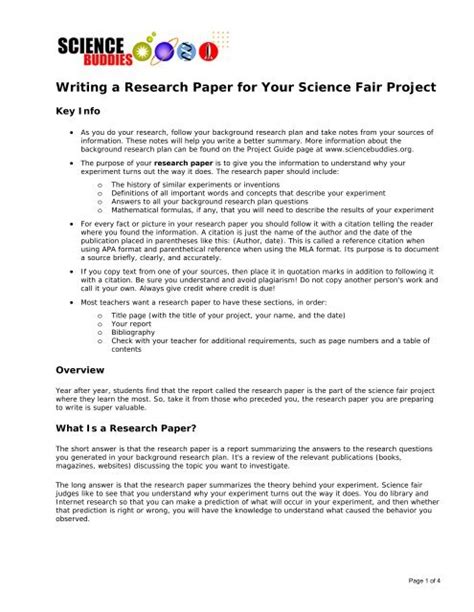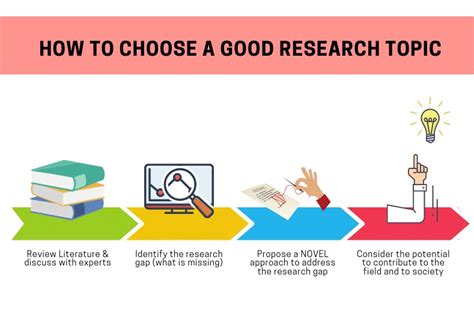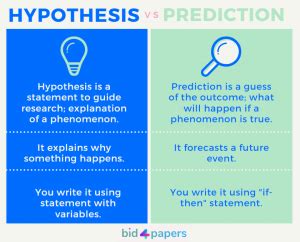Breaking News


Popular News


Learn how to write a winning science fair research paper with this comprehensive guide. From selecting a captivating topic to interpreting results accurately. Keep reading!Are you getting ready to participate in a science fair and feeling overwhelmed by the thought of writing a research paper? Don’t worry, we’ve got you covered! In this blog post, we’ll walk you through the essential steps to write a winning science fair research paper. From selecting a captivating research topic to conducting thorough background research, crafting a clear and concise hypothesis, designing and conducting experiments with precision, and analyzing and interpreting the results accurately, we’ll cover it all. By following these steps, you’ll be well on your way to creating a research paper that stands out and impresses the judges at your science fair. So, let’s dive in and learn how to write a research paper that showcases your scientific curiosity and critical thinking skills!
Contents

Choosing a captivating research topic is the first and most crucial step in the science fair research process. The topic you choose should be something that interests you and captivates the audience. It should also be a topic that has not been extensively researched, allowing for the possibility of groundbreaking discoveries.
When selecting a research topic, consider your interests and passions. What do you find fascinating? What questions do you have? The topic should be something you are genuinely curious about, as your enthusiasm will shine through in your research and presentation.
Once you have identified a few potential topics, conduct some preliminary background research to ensure that the topic is suitable for a science fair project. This involves reading scientific journals, articles, and books related to your chosen topics. Look for gaps in existing research that you could potentially fill with your own study.
Additionally, consider the practical aspects of your chosen topic. Do you have access to the necessary materials and resources to conduct a study on this topic? Can you design and carry out experiments related to this topic? These are important factors to consider when selecting a captivating research topic for your science fair project.

When embarking on a science fair research project, it’s crucial to begin by conducting thorough background research on your chosen topic. This step is essential in order to gain a comprehensive understanding of the subject matter and existing research. Start by brainstorming keywords and phrases related to your research question, and then use online databases, scholarly journals, and library resources to gather as much information as possible.
Next, organize your findings by creating a table listing the key points and details of each source, including the author, publication date, and main findings. This will help you keep track of the information you’ve gathered and make it easier to reference in your research paper.
Additionally, make sure to critically evaluate the credibility and relevance of each source, as it’s important to include only reputable and current information in your research paper. By conducting thorough background research, you’ll be well-equipped to craft a strong and well-supported hypothesis for your science fair project.

One of the most critical components of a winning science fair research paper is crafting a clear and concise hypothesis. A hypothesis is a statement that predicts the outcome of an experiment or research study. It is essential to ensure that your hypothesis is specific, testable, and based on existing knowledge. When crafting a hypothesis, it’s important to consider the variables involved in the study and to clearly outline the expected relationship between them.
When formulating your hypothesis, it’s crucial to conduct thorough background research to understand the existing literature and theories related to your topic. This will help you develop a hypothesis that is grounded in scientific evidence and is aligned with current understanding in the field. Additionally, your hypothesis should be based on a clear understanding of the research question and the specific objectives of your study.
It’s also important to remember that a hypothesis is not a definitive statement of fact, but rather a proposed explanation for a phenomenon. As such, it should be written in a way that allows it to be tested through experimentation or observation. Avoid making assumptions or overgeneralizing when crafting your hypothesis, and ensure that it is carefully worded to reflect the specific aims of your research.
Overall, crafting a clear and concise hypothesis is an essential step in the research process, as it forms the foundation for the rest of your study. By taking the time to develop a well-defined hypothesis, you can ensure that your research paper is focused, coherent, and contributes meaningfully to the scientific community.

When it comes to writing a science fair research paper, the process of designing and conducting experiments with precision is crucial for success. To begin, selecting an appropriate research topic that allows for clear and measurable experimentation is the first step in the process. Once a topic has been chosen, it is important to thoroughly conduct background research to gain an understanding of existing knowledge and potential variables that may impact the experiment.
After thorough background research has been completed, the next step is to craft a clear and concise hypothesis that outlines the expected outcome of the experiment. This hypothesis will serve as the basis for the experiment’s design and methodology, guiding the steps for precise data collection and analysis. Additionally, it is important to consider the design of the experiment and its potential variables to ensure that the results are both accurate and reliable.
One way to organize the details of the experiment’s design and methodology is to create a table that outlines the various components of the experiment, such as the independent and dependent variables, control groups, and any potential confounding variables that may impact the results. This table can serve as a visual guide for the experiment, allowing for precision in the collection and analysis of data.
Ultimately, the key to success in designing and conducting experiments with precision lies in careful planning, attention to detail, and a thorough understanding of the scientific method. By following these steps, students can ensure that their science fair research paper is based on accurate and reliable experimental data, setting them up for success in the competition.

After conducting experiments with precision, the next crucial step in writing a winning science fair research paper is analyzing and interpreting the results accurately. This phase requires careful attention to detail and a methodical approach to data analysis.
First and foremost, it’s important to organize the data in a clear and concise manner. This can be achieved through the use of tables and charts to visually represent the results. By presenting the data in a visually appealing format, it becomes easier to identify patterns and trends, which is essential for accurate interpretation.
Once the data is organized, it’s time to thoroughly analyze it. This involves looking for any outliers or anomalies that may impact the overall results. It’s also important to consider any potential sources of error and to assess the reliability of the data. A thorough analysis will provide a solid foundation for interpreting the results accurately.
When interpreting the results, it’s crucial to draw meaningful conclusions based on the data analyzed. This requires a deep understanding of the scientific principles underlying the research and the ability to make connections between the data and the hypothesis. Additionally, it’s important to consider any potential limitations of the study and to discuss potential areas for further research.

What are the key components of a science fair research paper?
A science fair research paper should include an abstract, introduction, materials and methods, results, discussion, conclusion, and references.
How should I choose a topic for my science fair research paper?
Choose a topic that interests you and is relevant to the field of science. Look for a topic that has not been extensively researched to make your paper more unique.
What is the importance of conducting background research for a science fair project?
Background research helps you understand the context of your project, identify what is already known about the topic, and develop a hypothesis based on previous knowledge.
How can I effectively present data in my science fair research paper?
Present data using tables, graphs, and charts to make it easier for readers to understand and interpret the results of your experiment.
What should I include in the discussion section of my science fair research paper?
In the discussion section, interpret the results, explain any discrepancies, and consider the implications of your findings. Discuss how your results relate to existing scientific knowledge.
How can I make my science fair research paper stand out to judges?
Include clear and concise writing, well-organized presentation of data, and a strong argument for the significance of your findings to make your paper stand out.
What are some common mistakes to avoid when writing a science fair research paper?
Avoid plagiarism, presenting unreliable data, neglecting to acknowledge sources, and overlooking the importance of thorough proofreading and editing.